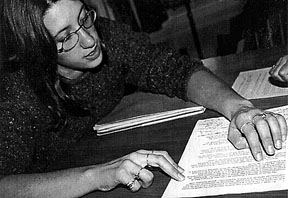![]()
GLBA officer offers personal perspective on recent, ongoing issues wracking Bates
By TINA IYER
Features Editor
 Thus, when planning and instituting the events for the weekend celebrating
National Coming Out Day and the weekend surrounding it, the students involved
"were expecting some backlash from the students but completely unprepared for
an institutional backlash," said Simons. "We were thrown into something that
we were not mentally, emotionally or physically prepared to do."
Thus, when planning and instituting the events for the weekend celebrating
National Coming Out Day and the weekend surrounding it, the students involved
"were expecting some backlash from the students but completely unprepared for
an institutional backlash," said Simons. "We were thrown into something that
we were not mentally, emotionally or physically prepared to do."
The students expected protection and support from the administration, not only with regard to this weekend, but also on a daily basis. Instead, with the reaction of the administration to the chalkings on the quad proclaiming queer pride, the students found themselves hurt, shocked and surprised.
For many queer students, the past three weeks have been the worst of their lives, according to Simons. Many have considered leaving the College, and most feel unsafe and unsupported.
The administration's reaction signaled to Simons that the administration's point of view was, as she said, "You can be who you are, but please don't be out about it." She believes gay and lesbian students are not allowed to be proud, and certainly the administration will not support them by way of classes or other forms of acknowledgement.
"This institution does not make people question their privilege," Simons noted, "and the whole Coming Out Day incident really made me question Bates." While Bates aims to promote diversity, "you get to this school and find that it [diversity] doesn't exist."
Dealing with this is overwhelming, according to Simons, but she, along with many other politically and socially active students, were determined to call the administration into question. The first forum to discuss the events of and reactions to Coming Out Day, the Monday evening after the chalking incident, "allowed voiceless students to voice their feelings of hostility and marginalization. It was important, but it wasn't really about action, just anger," said Simons. While this forum did address the issue of the erasing of the chalking as a hate crime, it was more a forum for emotion.
"I really feel that the administration expected it [student anger] to die down after [October] break," Simons said, but the students involved were determined not to let this bubble of anger and concern burst.
Much of Simons activism is due to her own personal feelings. "If things weren't going to change, I didn't want to be here," Simons said. "Part of my political action is personal. The administration's hate crime was a direct attack on me as a person, on my pride at who I am. I'm proud of being a dyke," she continued, saying she was not ready to allow institutionalized homophobia to defeat her or other gay, lesbian, bisexual, and transgendered students on this campus.
Simons, who has put in a great amount of time and energy in the past few weeks, as well as the normal load of activities and schoolwork, is concerned that it is students who have had to be responsible for wanting to institutionalize change.
"The administration has pushed all of this on students, when they should be concerned with issues of homophobia and marginalization," Simons said. "There needed to be a huge student upheaval for those issues even to be addressed. The drain on student resources was just intense. There was a core group of people doing an insane amount of work," she said.
While Simons acknowledges the value of the incident, and the fact that if Coming Out Weekend had gone as planned maybe there would have been no active movement to change Bates' policies immediately, she also notes that such a movement should not have been necessary.
"Eventually, it will be good for the campus. But why haven't the little instances gotten acknowledged?" Simons asked. "Nothing happens to people that commit homophobic acts."
Simons said that one of the main problems is that "people don't know that they're homophobic. People don't want to question their privilege, and people don't want to question their sexuality because it might make them less privileged."
The college has a facade of friendliness and peace that it tries to maintain, but "The creation of this aesthetic is at the cost of any marginalized person on campus," said Simons. Marginalized students have no voice, and are suppressed when they do attempt to voice their concerns or anger.
"Not talking about it [homophobia or other forms of marginalization] is internalizing it," according to Simons. If the community could react to and think about issues of homophobia, that in itself is an important step; Simons believes that "Once you say that you are homophobic, you can start to change it."
Simons claims that most of us are homophobic because of the heterosexist society in which we live. But, she said, "The classroom can address institutionalized homophobia, racism, classism, and sexism."
Simons perceives that many faculty members are unwilling to understand that social issues can and should be incorporated into the classroom. "Most students don't understand this connection, either," she said.
It is only when these issues are addressed personally and institutionally,
both in a small college community and in society, that progress can be made.
Last Modified: 11/5/97
Questions? Comments? Mail us.